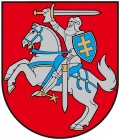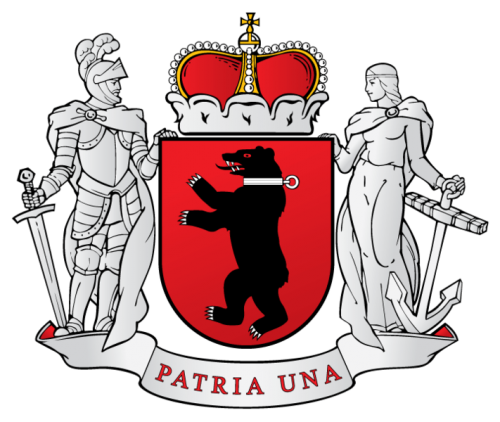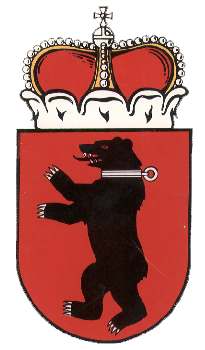Samogitia: Difference between revisions
Knorrepoes (talk | contribs) m (Text replacement - "===Official blazon===↵↵===Origin/meaning===" to "{| class="wikitable" |+Official blazon |- |'''Lithuanian''' | blazon wanted |- |'''English''' | blazon wanted |} ===Origin/meaning===") Tags: Mobile edit Mobile web edit |
Knorrepoes (talk | contribs) m (Text replacement - "Literature :" to "'''Literature''':") Tags: Mobile edit Mobile web edit |
||
| Line 32: | Line 32: | ||
{{media}} | {{media}} | ||
[[Literature]] : Information and image provided by Virginijus Misiunas, Vilnius. | [[Civic Heraldry Literature - Lithuania|'''Literature''']]: Information and image provided by Virginijus Misiunas, Vilnius. | ||
[[Category:Lithuanian Regions]] | [[Category:Lithuanian Regions]] | ||
[[Category:Granted 1994]] | [[Category:Granted 1994]] | ||
Revision as of 06:22, 15 September 2023
Lithuania heraldry portal
This page is part of the Lithuania heraldry portal |
Heraldry of the World |
|
Civic heraldry:
|
Other heraldry: |
SAMOGITIA REGION
| Lithuanian | blazon wanted |
| English | blazon wanted |
Origin/meaning
The arms were confirmed on July 21, 1994.
The history of the Samogitian coat of arms is not yet well-researched, so neither the time nor circumstances of its origin are known. It is usually asserted that as early as the 14th century the seal of a bear found in official documents of Grand Duke Vytautas is the Samogitian coat of arms.
It is also clear that in the second half of the 16th century the Samogitian flag depicted a black bear.
From the 16th century on the Samogitian coat of arms is represented as a black bear with a white collar, standing on his hind legs against a red background. Later, this picture becomes officially associated with Samogitia.
The first record of the Samogitian bear among the official seals of the Grand Duchy dates to 1669. This was during the rule of Mykolas Kaributas Visnioveckis. The seal remained in use until the third partition of Poland-Lithuania in 1795.
The origin of the Samogitian coat of arms is possibly related to the legendary theory of the Roman origin of Lithuanians. According to this story one of the Roman tribes that settled in Lithuania was named Ursinai (lat. ursus = bear). If this is true, then it is not clear if the Roman origin of Lithuanians is supported by the Samogitian use of the bear or if the Samogitians cleverly used the bear to develop the legend.
The small arms only show the bear:
Contact and Support
Partners:
Your logo here ?
Contact us
© since 1995, Heraldry of the World, Ralf Hartemink 
Index of the site
Literature: Information and image provided by Virginijus Misiunas, Vilnius.













